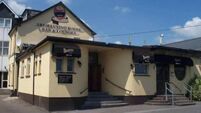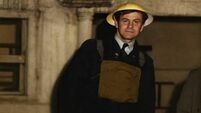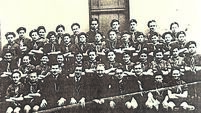Four Courts seized by irregular troops - and flooded Pana turns into a raft

SHORTLY after midnight on Thursday, between 300-400 irregular troops took possession of the Four Courts in Dublin, the Echo reported 100 years ago today, on Saturday, April 15, 1922.
Commandant Rory O’Connor states the occupation had been carried out on account of a lack of accommodation for his troops and not because a coup d’état is contemplated. At the same time, he told the press Mr Griffith and Mr Collins would have to give an undertaking that the Provisional Government would not function.
The flat of the city fell under flood yesterday evening due to torrential inland rain and a south-easterly gale causing a higher tide than usual.
By 9pm, Patrick Street was under water from Paul Street to close to the Statue. So too all the streets running off it. Part of Washington Street and the bridge leading over the river to the Muskerry Railway station were also submerged. The south quays, Blackpool and all low-lying areas suffered.
Shortly after 9pm, the water began to fall and within half an hour most of the streets were passable again.
On Patrick Street, the wooden street blocks for a considerable area were forced up and many washed down a good distance. Indeed, the whole surface outside the Wesley Chapel was comparable to a floating raft and one could feel it rise and fall walking across it. Some pedestrians traversing at this point were unaware of the instability and “went down” in the attempt. A large crowd gathered cut off on a dry patch at the corner of Winthrop Street and were heartless enough to cheer every unfortunate - and there were many - who fell.
A lady who tucked up her skirts and calmly waded through a depth of a foot or more received a great ovation. Some youngsters turned a large box into a boat, but it soon filled and sank with all hands on board to great applause.
Several people were ‘marooned’ at tram stops and in doorways.

Passage West town council has approved a housing scheme that will see the erection of seven to nine new houses at a cost of £5,580. The Council intends to strike a rate of 1s. 6d. in the £ for the financial year 1922-23 to help part finance the project and application will be made to the Provisional Government for a grant of £3,720. Mr W Mostyn reported the council’s housing sub-committee had inspected sites and had two recommendations, the field at Toureen belonging to Mrs Abbott and the quarry site on the Glen Road, Monkstown.
The Echo reported on much whispering from the “wise ones” regarding the Ford factory.
“Ford is looking for an excuse to get out of Cork,” one told me glancing over his shoulder. “English motor interests will do for the Irish motor industry what English cement interests did for the cement trade,” said another. While a third assured me that the IRA intended ousting Henry and turning the Marina buildings into a munitions factory.
Two alarming incidents occurred yesterday at the Lough when people became stuck in the muddy areas which have existed since the recent reclamation operation. At all times unstable, the mud was converted into a mire by heavy rain.
In the evening, passers-by were startled to see a young man making desperate efforts to extricate himself but succeeding only in making his perilous position worse.
Here also the task of rescue was difficult and by the time the two were eventually reached they were covered almost to the shoulders in mud. Happily, all three were brought to safety uninjured.
When the B+I Steam Packet the Lady Wicklow arrived at the North Wall, Dublin, from Cork yesterday, the policemen on board were referred to as Black and Tans and arrangements for their disembarkation immediately fell through.
A convoy of RIC motor vehicles was at the ready, but the shore workers refused to handle the baggage. The vessel then moved to the berths east of Alexandra Basin where disembarkation proceeded.
Some of the policemen and the baggage remained on board last night and a fully armed RIC guard patrolled.
The great hurling challenge tomorrow is between Sarsfields and Carrigtwohill at Riverstown.
Followers of the ash have often seen the two meet, but while Sarsfields produced some of the best men in the county at one time, they have had their day and have stepped down to make room for young blood.







